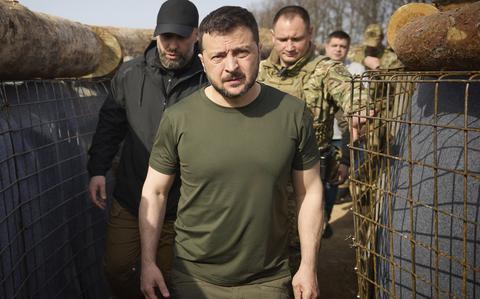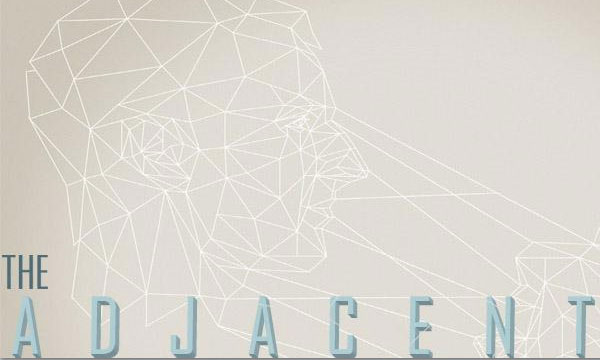Ukraine claims to be winning the fight against corruption. The West says: do more.


Volodymyr Zelensky inspects the fortification lines in the Ukrainian region of Kharkiv on April 9, 2024. (Press Office of the Ukrainian President)
KIEV — Ukrainian politicians say they are fighting corruption as fiercely as their troops are fighting Russian invaders in the east. But Western governments, including the United States, say that is still not enough – a source of rising tensions between Kyiv and some of its strongest backers who pose a constant threat to further economic and military aid.
Almost every month a new case is added, adding to a series of arrests and dismissals of prominent figures. At the end of May, the former deputy head of the presidential administration, Andriy Smyrnov, was charged by the Ukrainian Anti-Corruption Bureau with “illegal enrichment”. He had acquired real estate, vehicles and other assets worth more than ten times his declared salary and savings.
In April, President Volodymyr Zelenskyy fired Ilya Vityuk, the head of the cybersecurity department of the Ukrainian Security Service. A few days earlier, local media reported that Vityuk’s wife had bought an apartment in an elite district of Kyiv for more than $500,000.
Last year, the country’s chief judge, Vsevolod Knyazyev, was indicted and promptly fired for accepting more than $2 million in bribes. And a prominent oligarch, Ihor Kolomoisky, who was once a strong supporter of Zelensky, was jailed on suspicion of fraud, embezzlement and money laundering. He was subsequently accused of financing a contract killing in the early 2000s.
Ukrainian authorities say the cases are evidence of a concerted – and successful – effort to fight corruption. All of the defendants maintain their innocence, and their cases have not yet gone to trial.
“The fact that the number of cases has doubled does not mean that there is twice as much corruption,” says Oleksandr Klymenko, head of a special anti-corruption unit of the Ukrainian Prosecutor General’s Office. “On the contrary, it means that we are twice as effective as before.”
In the western capitals, however, people are not so sure. In Ukraine’s fight against corruption, billions are at stake – not only the country’s own tax money, but also western military and economic aid.
While there have been no direct allegations that American money or weapons have been mismanaged or embezzled, Republican members of Congress have cited corruption concerns as one of the reasons for blocking a $61 billion aid package – a months-long delay that allowed Russian forces to advance.
One of the allegations that Zelensky bought two luxury yachts with foreign money turned out to be false and came from Russian disinformation sources. Nevertheless, dozens of independent agents from the State Department’s Inspector General’s Office are stationed at the US Embassy in Kyiv, where they have broad supervisory powers and attend many diplomatic meetings.
For decades, corruption flourished in Ukraine. Oligarchs controlled key industries and parliamentary seats. Officials, including judges, were for sale. But many Ukrainian politicians say the country has made great progress in recent years and does not receive enough recognition for it.
Klymenko’s office is one of many anti-corruption bodies that have been created since the Maidan revolution in 2014. At that time, hundreds of thousands of Ukrainians took to the streets, partly because they had had enough of the rampant corruption under President Viktor Yanukovych.
Other new offices include the National Anti-Corruption Bureau, which investigates corruption cases, the High Anti-Corruption Court, the National Agency for Corruption Prevention, which formulates anti-corruption policies, and a special anti-corruption department in the Ministry of Defense. Numerous civic initiatives and media are also committed to exposing corruption.
But US officials, including Secretary of State Antony Blinken, say that is not enough. Ukraine has “taken important steps,” Blinken said in Kyiv last month. “But more remains to be done.”
In a speech, he said Ukraine needs “a strong and predictable regulatory environment, open and fair competition, transparency, the rule of law and effective anti-corruption measures.”
“A victory on the battlefield will prevent Ukraine from becoming part of Russia,” Blinken added. “A victory in the fight against corruption will prevent Ukraine from becoming like Russia.”
Senior officials in Kyiv, including Foreign Minister Dmytro Kuleba, reacted angrily to the scolding. “There is a certain level of corruption and there are facts about the level of corruption,” Kuleba said at a press conference with Blinken.
A meeting between Zelensky and Blinken was tense: The Ukrainian president expressed his appreciation for US military aid but seemed frustrated by Blinken’s focus on corruption, according to people familiar with the conversation who spoke on condition of anonymity because of the sensitivity of the issue.
Many in Zelensky’s camp argue privately that while corruption remains a challenge, fighting it would distract from what they believe should be the main goal: defeating Russia.
Senior Ukrainian politicians complain that Americans and Europeans often use the stereotype of a corrupt Ukraine as an excuse to delay or refuse urgently needed aid. The accusation is not just a cliché, they say, but evidence of hypocrisy in capitals that are themselves struggling with corruption problems.
“This is absolutely unfair,” Deputy Prime Minister Olha Stefanishyna, who is responsible for Ukraine’s accession to the EU, said in an interview last year. “We always want to say: ‘Why are you lecturing us? We see that your prime minister has been convicted of corruption.'”
Stefanishyna said she did not have a specific country in mind, but events over the past two years provided several examples. Politicians in Portugal and Spain, as well as representatives of the European Parliament, have faced corruption allegations.
After Western politicians called on Kyiv to introduce stricter lobbying rules, Stefanishyna referred to a report last year that said top EU enlargement official Gert Jan Koopman had owned a luxury hotel in Bali, Indonesia, since 2009, which he was not required to disclose under EU rules.
Olga Savran, head of the International Organisation for Economic Co-operation and Development’s anti-corruption network, said some of Ukraine’s harshest critics were spreading “politicised misinformation” and that Ukraine was neither “a hopeless case nor a hopeless case”.
“The glass is half full and half empty – there is a lot of progress,” said Savran. However, corruption remains a major problem in Ukraine’s “power structure,” which is still based on “oligarchic control and corruption at the highest level,” “and that trickles down to all other levels.”
Ukrainians point out that they are striving to meet the rule of law standards required to join the European Union, whereas Russia is developing into an increasingly totalitarian dictatorship in which corruption is rampant.
Yet Ukrainians cannot afford to ignore Western complaints, no matter how unfair they may find them.
Even some of the biggest corruption cases have left a mixed picture. Knyazyev, the chief judge, visited Washington just weeks before his arrest on bribery charges in May 2023 and was portrayed as something of a rock.
He met and impressed numerous high-ranking U.S. officials, including Senator James E. Risch (Idaho), the ranking Republican on the Senate Foreign Relations Committee.
“I told them personally that if they want to get rid of us, they only have to show the ugly face of corruption a little bit and then they will lose us and probably many other people,” Risch said in an interview. “They understood that,” he added.
Officials say the main pressure to eradicate corruption is coming not from the West but from the Ukrainian people. Public outrage over electoral fraud and government corruption sparked two revolutions in the country, and in 2019, similar anger propelled Zelensky to the presidency on a promise to eradicate corruption.
But while such rhetoric might appeal to Ukrainian voters – and Western politicians – it risks raising unrealistic expectations, experts say.
The key to these efforts lies in judicial reform, the “cornerstone” of the fight against corruption, says Daria Kaleniuk, head of the Anti-Corruption Action Center, one of Ukraine’s main corruption watchdogs.
“If judges are corrupt, society is lawless and there is a risk of drifting into autocracy,” Kaleniuk said.
For some, the biggest setback would be if Russia won the war.
“In wartime, we have journalists who investigate corruption cases,” said Yaroslav Yurchyshin, the former head of Transparency International in Ukraine and now an opposition member of parliament. “Does that also happen in Russia or Belarus?”
Stefanishyna said there was “an enormous tendency”, driven by Russian propaganda, to view Ukraine as a “failed state”.
“Whatever we do will never be seen as a real success,” Stefanishyna said. But given the billions of dollars in aid flowing to Kyiv, she understands that Ukraine must be seen as “holier than the Pope.”



